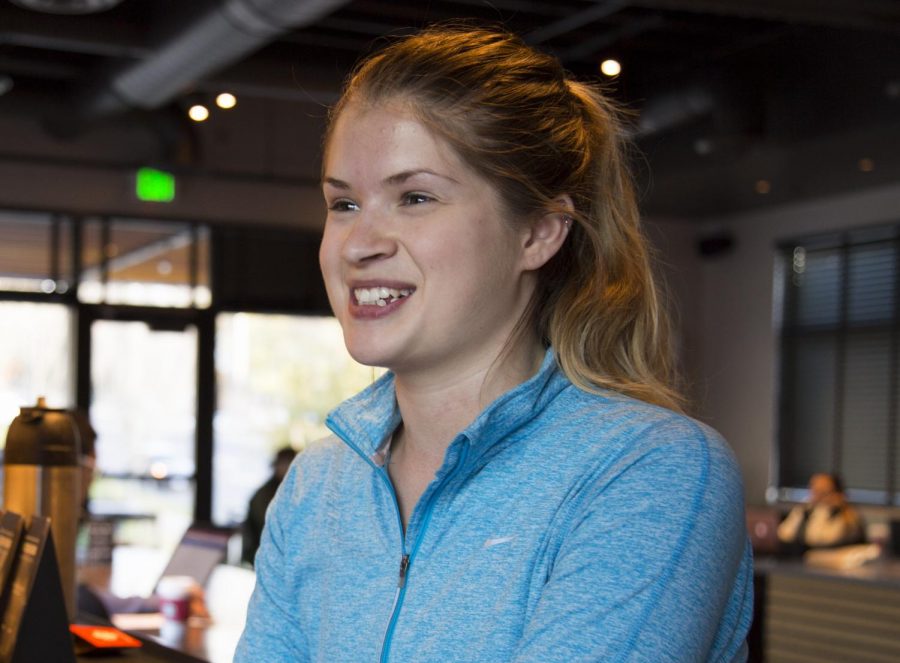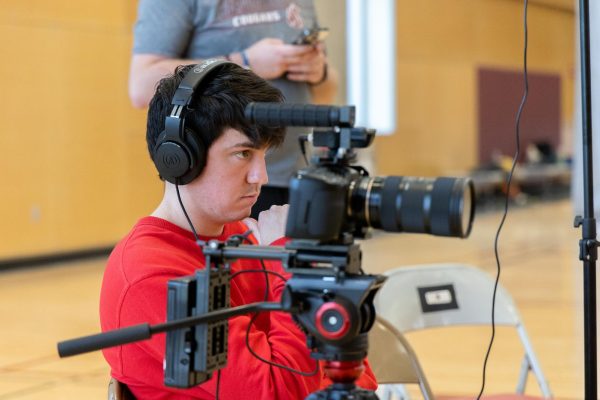Body mindfulness lowers stress
Kinesiology Club strives to understand relationship between daily physical movement, affects on mind
ZACH RUBIO | The Daily Evergreen
Kinesiology Club Co-President Jessica Beitner discusses physical and mental branches of kinesiology, the study of movement, and the health effects Wednesday. The group approaches these topics from a medical perspective.
November 8, 2017
The way in which people carry their bodies under stress can affect physical and mental wellness.
Kinesiology Club Co-President Jessica Beitner said there is a cause-and-effect relationship between stress and bodily reactions to it.
“As college students,” she said, “coping with stress is something we have to deal with all the time.”
Stress can have a positive influence on the body — it allows people to care about and react appropriately to events in their lives. When coping mechanisms are not used properly, however, stress can become a disease that ravages the body, Beitner said.
This leads to a spike in cortisol, a chemical that affects the digestive system and heart rate, and forces the body to work much harder than it should, she said.
When people experience an unhealthy level of stress, this can lead to acne breakouts and constant fatigue, and can also cause a feeling of inadequacy and overwhelming pressure, club treasurer Gaby Daly said. This is why exercise is one of the most effective coping mechanisms of stress.
Exercising is not as simple as going on a run, Beitner said. Being mindful in one’s exercise, meaning without any distractions, offers a more beneficial workout.
“Listening to music is OK when you’re working out,” Beitner said, “but you get the most out of your exercise when you’re completely aware of your body. It is about being conscious in the way your body moves.”
Mental health is just as important as physical health, which is why there is such a variety of topics to discuss under the field of kinesiology, Daly said.
Club representative Cameron Townsen said that when people push themselves to do different things, it challenges them to find an activity they enjoy.
“If you’re pushing yourself physically, you’ll become better at solving problems within your life from a mental standpoint,” Townsen said.
Kinesiology students may experience an advantage, Daly said, because of their knowledge of the way everyday actions, like posture, connect to mental health. They may be more adept at implementing proper changes.
“Once I realized that there are basic remedies to stress that generally work for everyone,” Daly said, “the more equipped I was to handle my own anxiety.”
The club often talks from a medical perspective about everyday movement.
Even if exercising is not an option, some basic remedies are deep breathing techniques to calm the nervous system, yoga, meditation and simply knowing one’s limits when it comes to work and school, Daly said.
Kinesiology is a diverse and complex branch of medicine and is a grounded, yet intimate, way of understanding the body, Townsen said.
“Within almost any profession under the kinesiology field, you’re forming these relationships with people and athletes who have specific problems with their body,” Townsen said. “There’s definitely a focus on academics, but overall as a club, we are building a health-conscious community of students.”
The Kinesiology Club meets at 6 p.m. every other Tuesday in the Physical Education Building, Room 136.























